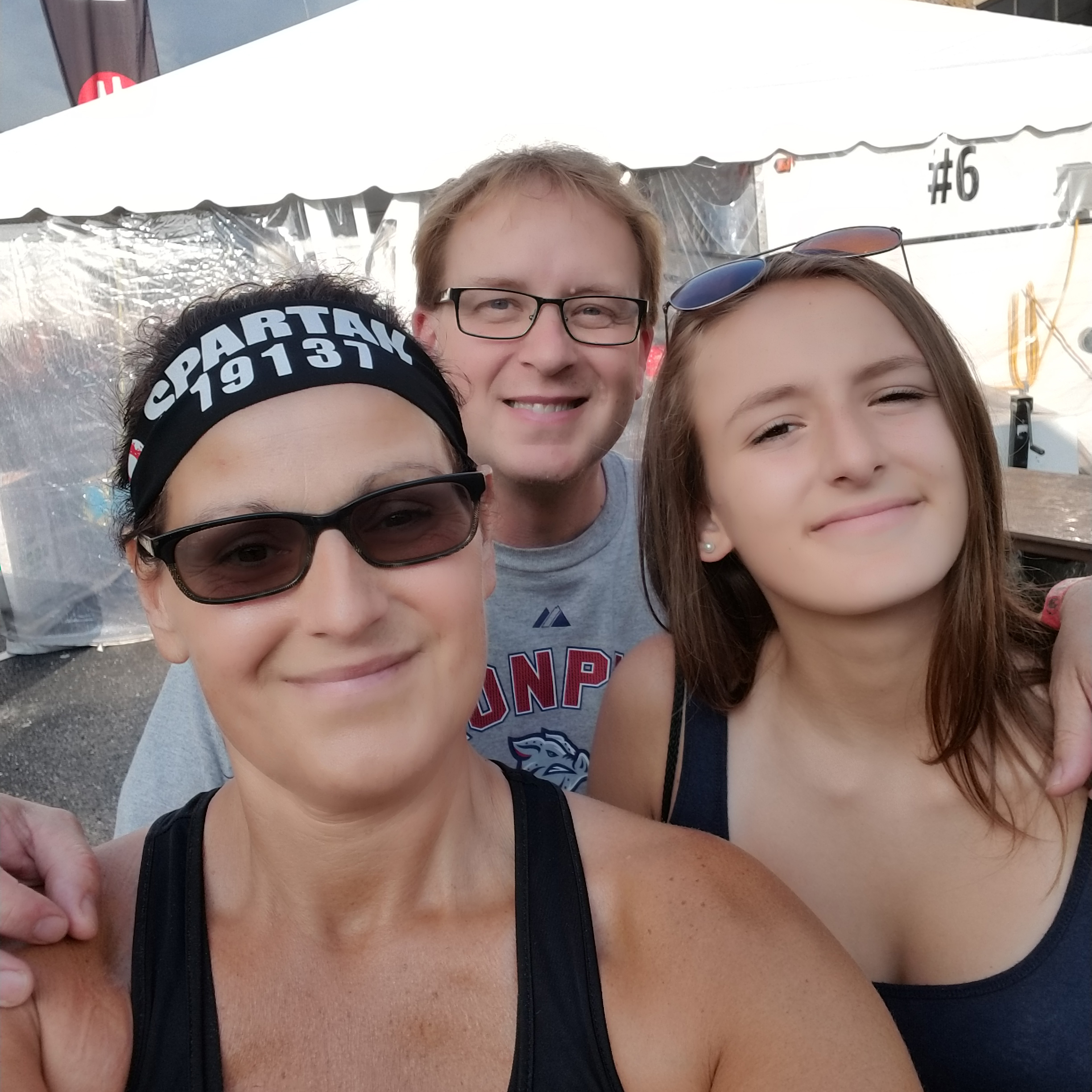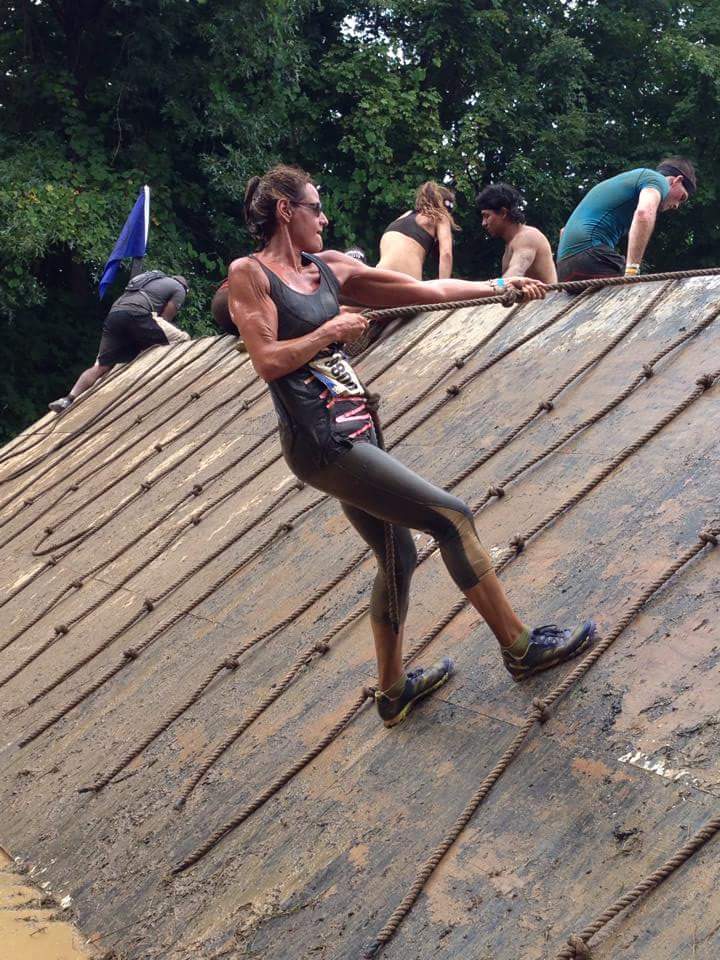Chelle’s Journey: The Greatest Obstacle
“I would be doing a disservice if I didn’t focus on the good stuff….With maturity and age, I see that it is not what you are given, it’s what you do with it.” ~ Chelle Benner
Strong. Agile. Flexible. Muscular. Powerful. Persistent. It’s hard to believe Chelle Benner, a lithe woman with dark black hair that tumbles beneath her shoulders, when she says that for most of her life, she was unhealthy.
She remembers nursing her overweight mother through diabetes, and determining not to have the same ill health. “My light bulb went off, and I thought, ‘If I don’t change, I am going to be like my mom, and my daughter Savannah will be like me.’ I saw this chain that needed to be broken,” she says, nursing a cup of coffee.
So, six years ago Chelle, in her mid-forties, underwent bariatric surgery, losing 130 pounds. But that wasn’t good enough. For, although she was markedly thinner, she was also frail—which was not what she wanted; she wanted to be fit.
She recalled seeing an advertisement for The Biggest Loser Off-Road Challenge, and she and some “bari” friends signed up for this race, which took place on a portion of an actual race course owned by Spartan, known for its intricate obstacle courses. Chelle loved the race, and afterward, vowed to return the next year to complete the entire Spartan Sprint course. She spent the year learning to flip 300-pound tires, climb walls, crawl under barbed wire, throw spears, and swim through streams. Her transformation was successful. Sixty-five percent of her body weight became muscle.
“I was,” she says, sitting upright in her grey hoodie, “in the best shape of my life. Last year, I decided to train for a half-marathon.” In January 2018, she began 14 weeks of training for the 13.1-mile race.
“I successfully finished at 2:20. I was happy, because I’d never just run a race without carrying rocks or traipsing through mud,” she smiles broadly in recollection. Her husband, as usual, cheered from the sidelines and took photos.
The Monday after the race, she had what she assumed were the mysterious runner’s trots, as well as excruciating pain when anything, including her kitten, touched her stomach. Because she was a bariatric patient, she worried about hydration, so she phoned the bariatric program dietician who suggested she call her primary care physician if her diarrhea didn’t stop in 48 hours. It didn’t.
Her PCP examined her, and found that Chelle tested positive for blood during the rectal exam. This was puzzling. She followed up with a gastroenterologist, who thought she might have ulcerative colitis or ischemic bowel. She scheduled an immediate CT scan. Now she was no longer just puzzled; she was worried; maybe this wasn’t runner’s trots, after all.
At the imaging facility, she was told the protocol: she’d have the scan and wait until the tech reported the results. But her concerns worsened when that protocol wasn’t followed. She waited and waited, and then she was told to go home; the doctor would call her. Intuitively, she knew something was wrong—but not what.
“I don’t remember the conversation with my doctor,” says Chelle, stretching out her legs, clad in black UGGs, “but when I hung up the phone, I knew I had Stage 3 rectal cancer.
“I called my husband because I was alone. He came home, but I don’t remember those conversations either. In fact, that week is a blur.” She raises her finely etched dark eyebrows.
Chelle tells her story calmly, matter-of-factly. “I have to disassociate myself from my fears,” she says. “This takes me back to a time where I don’t want to be.”
Despite her 34-year nursing career—31 as a bedside nurse, and the last three as the Graduate Clinical Liaison of DeSales University’s Nurse Practitioner Program—she was stunned.
“On reflection,” she continues, “things that I attributed to my bariatric surgery were probably symptoms of rectal cancer. But I never pulled it all together. I was so busy being healthy. Who would think that I had cancer? It was like someone punched me in the gut because I was way too healthy.”
Chelle slides her dark-framed glasses upward on her nose. “I had bariatric surgery to avoid a heart attack or diabetes. After everything I did to be a better person—I got cancer.” She shakes her head, still in disbelief. “But I said to myself, ‘You’re in the best shape of your life to fight this battle. ‘” And so, she began a new obstacle course: fighting rectal cancer.
Her primary care physician recommended an oncologist who advised her to undergo radiation, oral chemotherapy, surgery, and clean-up chemo. Ok, so that was the plan. But there is no standard treatment for rectal cancer, so the plan changed when, the following day, her oncologist phoned to say that, after thinking about Chelle’s case, she’d contacted a colleague who suggested that the plan include IV chemo, radiation, oral chemo, and then surgery.
Then the plan changed again when Chelle’s coworker and friend Laura attended a medical symposium. She approached the speaker, a noted oncologist, about Chelle, and he recommended that she seek treatment at a National Cancer Institute hospital, a recommendation with which Chelle’s local oncologist agreed. “Part of the reason I am alive today is because Laura advocated for me,” insists Chelle. “She went up to a man she’d never met and got the best possible advice for me.”
The doctors at the NCI hospital agreed with the revised plan. The idea was to shrink the tumor as much as possible before surgery.
Chelle underwent four months of biweekly IV chemo. After a month off, she began 28 days of radiation and oral chemo. Two months later, in February 2019, she underwent a low anterior resection (LAR) to remove the tumor and give her a temporary loop ileostomy. The surgeon removed the tumor and 26 lymph nodes, only one of which was positive. The incision was 27 centimeters long.
Three weeks later, Chelle returned to her doctor who marveled at the speed of her recuperation. Then, six weeks to the day of her original surgery, she had a second surgery to reverse the ileostomy.
By early April, she was permitted to jog. She only ran 2 1/4 miles, but everything was sore, and the skin on her arms was no longer lined with corded muscles. In May, she was permitted to lift more than the 20 pounds to which she’d been restricted.
“My daughter, who’s now 17, had to write a paper in which she had to discuss a difficult moment,” says Chelle, the many thin gold rings on several fingers glinting in morning light. “She said it was finding out her mom had cancer. She also said that she could be strong because of the example I set. I was floored. You never know how much your kid takes in.
“But,” she continues, “I don’t know if I’m strong or tough. I had a rough childhood, but when I started dating my husband Paul, around 20, his family took me in.” She worked as a nurse’s assistant after high school, and after marriage, both she and Paul got college degrees–she in nursing and he in computer science.
For years, Chelle and her husband struggled with infertility, and then one day, when they’d abandoned the idea of conceiving a child, she became pregnant.
“I am blessed,” she says simply. “Through this whole journey, the universe has been kind to me.
“It’s true I had a tough childhood, but I had a great mother. I faced weight problems, but I discovered Spartan. I had trouble getting pregnant, but I have a fabulous daughter. I had cancer, but I found incredible doctors and have a terrific support system.
“I would be doing a disservice to the universe if I didn’t focus on the good stuff among all the bad stuff. With maturity and age, I see that it is not what you are given, it’s what you do with it.” Chelle glances at the red bag by her side which her “fit friends”–her online bariatric support group with whom she does monthly online fit challenges–had filled with supplies to help her get through chemo. It says, “Chelle/Warrior.”
“I’d go to chemo and pull the curtain around me to shut out any negativity from other patients. I put in my ear buds and listened to the 49 fight songs like Unstoppable and Survivor on the playlist that my family and friends put together for me,” she says vigorously. “The Lehigh Valley Spartans kept me going too. They showered me with support and gifts. I wasn’t in this race alone.”
Chelle has returned to her battle ropes and slam balls, her 60-pound Atlas ball made of solid concrete, and the training room in her garage.
“Many people go through a cancer journey and reorder their priorities. But I knew mine: my nucleus is my husband and my daughter, and an understanding to live life now, not to wait, and to seek out the positive. I ask myself, ‘Where in this situation can I find happiness?’”
_____________________________
Chelle has attended support programs at the Cancer Support Community.



